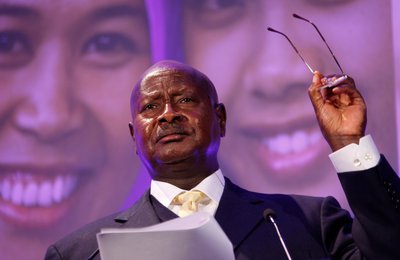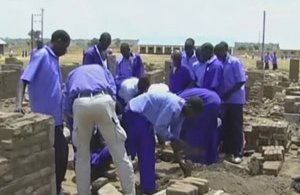Uganda’s recent presidential election reveals strategic challenges for local peace actors and civil society, in terms of sustainable peacebuilding and the democratisation process in Uganda. Some of the lessons from it may be useful for peace builders elsewhere, when designing and advocating peaceful, legitimate elections. In general, it begs the question - How broad must our definition of a ‘peaceful’ election be?
Incumbent President Yoweri Museveni was declared the election winner with 68% of votes, according to the official Electoral Commission. This figure is disputed by opposition sources such as the FDC, who claim that he only got 45% - and actually lost to his nearest rival by 2 percentage points.
Either way, Museveni’s result as a percentage of Uganda’s registered voters is not high: 39% or 25%, depending on which figures you use. Only 57% of the 13.9 million registered voters turned out to cast their ballots: again it’s an approximate figure, but it indicates a growing popular frustration with regular elections as the means of reflecting people’s wishes in governance. People shunned the elections because they thought their votes don’t count. In some polling stations, not even a single voter turned out to vote.
Civil society and local peace actors may have to ask themselves whether a violence-free election necessarily translates to democracy and good governance.The election process was largely calm and free of physical violence: but voter bribery, intimidation, delays, apathy and lack of civic education marred the entire process. So civil society and local peace actors may have to ask themselves whether a violence-free election necessarily translates to democracy and good governance. Is voter bribery a better alternative to physical violence? And if so, how does it affect democratisation in Uganda? What impact do heavy military and police deployment at polling stations have on voter turn-out or the exercise of free will? Why is it that Ugandans are losing interest in electing their leaders? What can be done to promote citizens’ participation in governance there?
The Museveni victory in this election was quite consistent with the opinion polls conducted prior to the election. Therefore, whereas all the losing candidates disputed the outcome as flawed, civil society and international observers believed the election was largely ‘free and fair’.
The Election Commission, despite concerns over its impartiality, did a commendable job. But its competence and credibility are in question. There were allegations of ‘ghost voters’ in the register. Some names were missing from the registers, and voting materials arrived late at some polling stations. A few pre-ticked ballot papers were discovered at some polling stations, though this was not widespread. Furthermore, there were some isolated incidents of violence and rigging. The European Union observers’ preliminary report noted that ‘some of the logistical problems could have been avoided by better planning and co-ordination’.
For the future, local peacebuilders and civil society actors should engage more closely with the Electoral Commission throughout the continuum of an election process: from civic education, voter registration, verification, nominations, campaigns, polling, vote counting, through to the transmission and declaration of results.
Several factors account for the peaceful nature of this year’s election: the contribution of local peacebuilders is certainly one of them. The most important contribution was a Citizen’s Manifesto, produced by a coalition of civil society organisations, to demonstrate to all candidates key issues affecting the country. Local peace activists organised national prayers for peaceful elections and constantly implored the candidates to commit to a peaceful process and inter-party dialogue. Local peace activists also engaged with the Electoral Commission to ensure a level playing field for all candidates - albeit with limited success.
Much of the advocacy, however, focused on condemnation of physical violence rather than on compliance with electoral laws or with principles for promoting good governance. Little effort was directed at civic education. Civil society and local peace activists organised a conference with candidates, to commit to non-violence after the election, but rarely addressed the entire spectrum of the election. A coalition of civil society organisations was formed to advocate for a peaceful election, but little conversation took place with the government to limit the massive spending or the intimidating deployment of military police in the name of providing security.
Little progress was made to legitimise the entire electoral process or to promote a viable democracy.Therefore, while a violence-free process reflected the unyielding advocacy by local peacebuilders, little progress was made to legitimise the entire electoral process or to promote a viable democracy. The electoral laws still favoured the incumbent, who enjoyed unrestricted use of state machinery and apparatus. Media were biased in coverage of the incumbent and opposition candidates. There were suspicious incidents in deployment of the military and police. Very few, if any, of the local peacebuilders and civil society activists questioned the economic aspect of this election: apart from the outrage sparked by a mid-term supplementary budget and a 20 million shillings ‘bonus’ paid to Members of Parliament in the middle of the campaign (allegedly to monitor government programmes), the voters’ bribery continued unabated. The monetised campaign diverted attention from the appalling state of social service delivery countrywide, and further entrenched a perception of corruption impunity.
But the ultimate strategic challenge for local peacebuilders is that political figures are often unpredictable in their strategies to subvert a meaningful democratisation process. The run-up to this election was marred by concerns of possible physical violence and a Kenyan-style post-election crisis. This fear was driven by Uganda’s history of fraudulent elections and by the uncompromising rhetoric that dominated the campaigning. Past elections had been characterised by intimidations, outright violence against opposition groups, and massive riggings. This election, however, was largely violence-free throughout the campaigns and voting process. All candidates traversed the country freely to canvas for votes, and opposition rallies were respected by the police. The unique feature of this election, however, was that money replaced physical violence. And the lesson for local peace activists and civil society is to broaden their advocacy goals for a successful election, to include controlling financial spending and reforming election laws to undercut the power of incumbency. Building a sustainable participatory democracy and good governance go beyond mere ‘peaceful’ elections.













